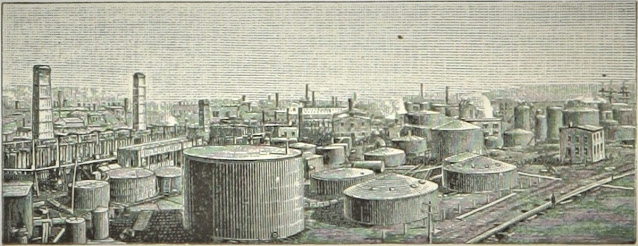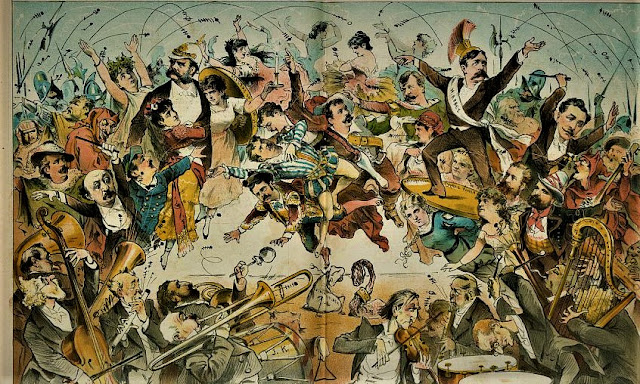...through King Arthur, who did let morality prevent him from separating his beloved Guinevere from her lusted after Lancelot. And the “ménage-a-fools” between “Big” Jim Fisk, Josie Mansfield and Edward Stokes repeated the familiar sad story, with the standard final twist.
These self destructive convergences usually leave the participants exhausted and mumbling some absurd self justification, like “The heart wants what the heart wants”, when, in truth, the more apt description might be, “Stupid is as stupid does.” It needs to be noted that none of these disasters, which we all are suffer from, from time to time, could occur without the active participation of all members. The truth is the participants may be helpless, but they are never blameless.
“Big” Jim’s friends, who knew his love letters to Josie to be harmless drivel, urged him to publish them first, and thereby remove their threat. But this “Prince of the Erie Railroad”, this master of Wall Street, this robber baron supreme, refused to do so. Instead he bemoaned his fate, “By the Lord, this is my heart that you want me to make a show of, and I won't.” He was, however, willing to make a lesser show of it, slower and more deliciously painful, and far more dramatically detailed, by not paying the $200,000 demanded by Stokes (which "Big Jim" could easily afford) or by publishing the letters himself, which might even have turned a profit. So, the curtain went up on the Third Act of this melodrama.
About one on the afternoon of Saturday, 6 January, 1872, “Big” James Fisk got the word that a grand jury had indicted Josie and Edward Stokes for attempting to blackmail him. He was in the offices of the Erie Railroad, on the second floor of his own Grand Opera House.
At about 3:30 pm, a visiting friend, gambler John Chamberlain, was leaving the Opera House, when he saw a carriage crossing the intersection of 8th Avenue and 23rd Street. As the carriage clipped past him, Chamberlain saw, peeking out from the passenger compartment, and staring bitterly up at the Erie Corporate offices, Edward Stokes.
Ten minutes later “Big” Jim Fisk was in his own carriage, heading uptown, to 44th and Amity Street, later to be renamed 3rd Avenue, to the Grand Central Hotel, around the corner from “Commodore” Vanderbilt’s brand new Grand Central Railroad Station (above).
As he entered the hotel “Big” Jim recognized a porter by the name of John Redmond, and asked him to contact one of the guests, a daughter of Samuel B. Morse, inventor of the telegraph. The lady was living at the hotel, and had recently suffered a death in her family. Big Jim wanted to inquire as to her condition. Redmond followed “Big” Jim up to the stairs toward the second floor lobby.
As they turned the corner at the base of the stairwell they were confronted by Edward Stokes, waiting at the top of the stairs (above) . Arm outstretched, he was pointing a handgun down the stairs - at them. “Big” Jim Fisk stopped, halfway up. Edward said firmly, “I’ve got you now,” and fired twice. Bang! Bang!
Both shots hit Fisk, who cried out, “For God’s sake, will anybody save me?” The answer was "no".
Redmond, the porter, dove for cover. Fisk staggered back to the foot of the stairs, where, out of the field of fire, he collapsed.
Once they were sure the shooter had fled, Redmond and other employees carried Big Jim Fisk back up the stairs and into an empty room. He never left it.A bellboy had followed Edward (above), and the shooter was arrested trying to leave the hotel a few minutes later. As the police were transporting Edward to jail, he asked if he could go into a bar for a drink. The answer was “no”. He later asked his jailer, “What do you think, is the man seriously injured?”
The man was. To one visitor, “Big” Jim explained he felt as if he had just eaten green apples. “I've got a belly-ache,” he said. The gambler, John Chamberlain, did not believe it when he was told of the shooting. “I’ll lay $500 against $100 that it's false.” He would have lost that bet.Josie, the self-centered center of this melodramatic triangle affair, had no such doubts. Shocked when a newspaperman told her of the shooting, she blurted out, “Edward must have been insane!” Then she immediately added, “I wish you to understand that I am in no way connected with this sad affair.” And finally she insisted, “I have only my reputation to maintain.” Well, it was a little late for Josie's reputation. But she still had hopes. Josie always had hopes.
And he didn't. Fisk died that very evening, at 10:54pm, surrounded by a chorus of women who had depended on the "Big Jim" for financial support.
They took his body back to his childhood home, in Brattleboro, Vermont, for burial.
The newspapers were endless in their praise of the man, as unrelenting as they had been, just days before, in their ridicule of him. His love letters, published a week after his death, were so banal, that they created barely a ripple.
As writer Edmund Stedman noted, “"Had Stokes been an illiterate laborer, he would have dangled in a noose two months later.” But Edmund's family was still wealthy enough that it took three trials to convict him of manslaughter.
The newspapers were endless in their praise of the man, as unrelenting as they had been, just days before, in their ridicule of him. His love letters, published a week after his death, were so banal, that they created barely a ripple.
As writer Edmund Stedman noted, “"Had Stokes been an illiterate laborer, he would have dangled in a noose two months later.” But Edmund's family was still wealthy enough that it took three trials to convict him of manslaughter.
And even then he was sentenced to only six years in Sing Sing prison. He was a popular and entitled inmate, and served only four actual years.
Once out he operated restaurants, and ended his life locked in lawsuits with the very people who had rescued him financially after prison. He died in 1901, at the age of 61.on 2 November, 1901.
For Josie Mansfield (above), the loss of “Big” Jim and Edward Stokes meant not just the loss of financial security, but, more importantly, the loss of drama in her life. Not that she didn't go looking for it. She testified at Edmund’s first trial, but was unavailable for the two that followed. She sued “Big” Jim’s widow, Lucy, for that $50,000 she still alleged "Big" Jim had invested for her, but that case was thrown out of court.
She moved to Paris, where in 1891 she married a rich alcoholic, only to divorce him six years later. In 1897 she moved to Boston to live with a sister, then to Philadelphia to live with another sister. In 1899 she moved to Watertown, South Dakota to live with her brother. She died, back in Paris at the American Hospital, in 1931, having out lived her sugar daddy James, “Big” Jim Fisk, by a lifetime - 60 years. She even outlived the man she had overthrown a fortune for, Edmund Stokes – by 20 years.
At times the three had been a national laughingstock, a pubic delinquency and a media soap opera on a par with any modern day oversized love nest fest. It will not be long before another trio of thespians feels compelled to raise the curtain on another performance of the same play, and carry the character arcs to their illogical and inevitable dramatic conclusion, again. And again. And again. To quote Charley Harper, from "Two and a-Half Men"; Love is not blind. It's retarded."

- 30 -






































































































